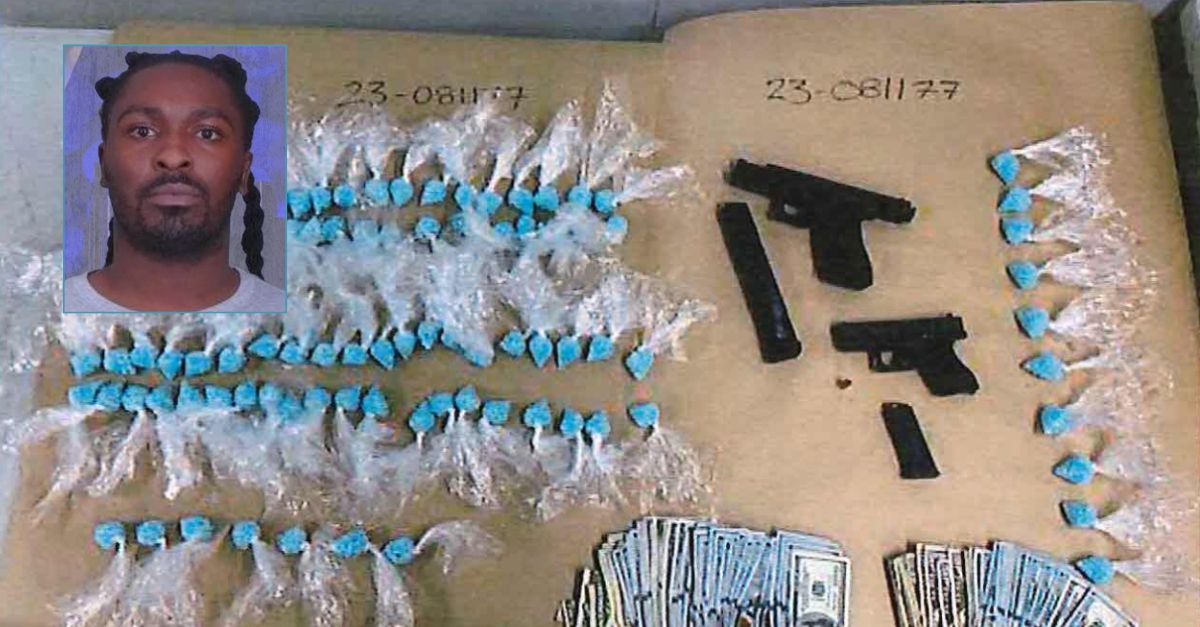
Montez “Tez Blood” Brown (Evidence photo from court documents; Mug shot photo via KSTP 5 Eyewitness News/YouTube)
A high-level fentanyl trafficker and gang member from Minnesota was sentenced to nearly 20 years for a list of federal racketeering crimes, including attempted murder, narcotics trafficking, and possession of a machine gun.
Montez “Tez Blood” Brown, 32, was sentenced on Wednesday to 235 months in prison by U.S. District Judge Nancy Brasel. Brown pleaded guilty in November to one count of Racketeer Influenced and Corrupt Organizations (RICO) conspiracy and one count of conspiracy to distribute controlled substances.
“Gangs have created a public health crisis, and gang wars have not only caused exponential trauma on the north side but across all of Minneapolis, and it’s time to stop it,” said Brasel, a Donald Trump appointee, before handing down the sentence, local ABC affiliate KSTP-TV reported.
The judge ripped Brown, The Star Tribune reported.
“This is the end of the line,” Brasel reportedly said. “Prison is the only tool that I have, and being lenient here will deter no one.”
In a statement, U.S. Attorney Andrew M. Luger said the feds were cracking down on gangs that have had a stranglehold on north Minneapolis for years with the RICO Act — the same tool prosecutors used in the 1970s to bust organized crime.
“Minneapolis gangs have caused a staggering amount of damage to the community through retaliatory shootings, narcotics trafficking, and other illicit activity,” he said. “Individuals who choose to fuel violence and destruction on behalf of a criminal enterprise such as this will be held accountable under federal law.”
Brown’s attorney, Frederick Goetz, did not immediately respond to a request for comment from Law&Crime. He had asked for a prison term between 11 and 12 years, saying Brown sought to better himself in the year since being jailed in this case, the Star Tribune reported.
Brown was a member of the Highs gang that authorities said committed murders, robberies and trafficking in the area since 2004. In this indictment, authorities said 13 other members and associates of the gang have pleaded guilty, and five have been sentenced for their crimes.
The indictment said the Highs proved their loyalty to the gang by “putting in work” — committing violence or introducing a source for drugs or firearms. Members who fail to put in work are kicked out of the gang, and the price is a beating as part of the exit process, authorities said.
The indictment lists Brown’s crimes dating to Sept. 27, 2016. He fired a gun from a car into another vehicle, injuring someone identified as “Victim A” in court documents.
In January 2017, Brown advertised the sale of oxycodone hydrochloride on Facebook and sold two oxycodone hydrochloride pills. That same month, he posted a video to Snapchat in which he possessed two firearms. Later that month, he ran from police outside a home in gang territory where he and other gangsters were peddling oxycodone hydrochloride, court documents said.
The criminal complaint outlines his arrest.
Authorities pulled him over in April 2023 after tailing him from his home, watching him get into a Chevrolet Tahoe and drive away. During a search of the vehicle, officers found about 1,000 blue “M-30” pills, which authorities said tests later showed the presence of fentanyl. Police found a key to a second vehicle, a Mercedes SUV, and $2,728 cash on Brown.
In a brown bag on the floor of the Mercedes, officers found 8,700 blue “M-30” pills in about 87 plastic bags. A stolen Glock model 17, 9 mm, equipped with an extended magazine and a “switch” — a device for converting a semi-automatic firearm into a fully automatic firearm — was wrapped in a sweatshirt in a blue backpack on the floor of the Mercedes.
Under the front driver’s seat of the Mercedes, wrapped in a Target bag, was a .380 caliber Glock model 42. Officers recovered $6,000 in cash from Brown’s residence.
Have a tip we should know? [email protected]

